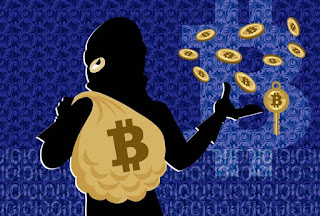There's a lot of buzz going on in the cryptocurrency world, most
especially around BTC. Investors are coming from different parts of the world
to join the Bitcoin community. Some are even asking that the government step in
with some kind of regulation to make the cryptocurrency safer. The fact that
Bitcoin became a success have allowed it to gain more followers, provided a
rise to new cryptocurrency launches, and allowed a wave of startups that are now
thriving on the blockchain technology.
However, with all the hype and fuss around Bitcoin, many investors
are still concerned about how secure their investments are. A lot of people are
raising the question, "can Bitcoin be hacked?" And if it can, how can
those who have invested in the cryptocurrency protect their investments? Well,
in this article, we'll be answering these question and providing you with
enough insight to help you secure your investment. Let's get right to it, shall
we?


THE SECURITY OF BITCOIN
Launched in 2009, Bitcoin was designed to be a decentralized
digital currency. Putting it in simple terms, it was designed as a currency
that won't be regulated or overseen by any kind of administrator, like a bank
or the government. Bitcoin revolutionized the peer-to-peer transactions that is
being experienced in the crypto world, enabling users to send the currency
directly to each other without the need of a middle man. For the recording and
verification of transactions, BTC uses the blockchain technology, which is some
sort of public ledger.
Ever since the development of Bitcoin, the issue of security has been
one of utmost importance. On one hand, hacking bitcoin itself is very hard,
almost impossible to be precise, and this is due to the blockchain technology
the cryptocurrency is built on. The blockchain is always reviewed by BTC users,
which makes hacking the coin unlikely.
Now, on the other hand, although bitcoin is not susceptible to
hacking, it still doesn't guarantee that it's a safe investment. How you might
ask? Well, there are some potential security risks at different stages of the
bitcoin trading process.
TRANSACTIONS AND WALLETS
You see, bitcoins are either stored on a website or software known
as wallets. The cryptocoins are also traded through cryptocurrency exchange
websites such as Poloniex and Coinbase. These exchange websites bring investors
and users together so as to be able to exchange fiat currency (or other digital
currencies) for BTC and vice versa. This is where hacking comes into the
picture.
In order for these exchange websites to successfully execute a
bitcoin transaction, they'll have to use the two-factor identification process,
which involves sending a notification to the cell phone number that has been
linked to the Bitcoin accounts conducting the transaction so the users will be
to authenticate the transaction. This may seem like a great idea as you'll get
notified via email and texts before completing a transaction. But that's also
where your BTC is most vulnerable.
For a hacker to be able to steal your funds, what they do is use
different snooping methods to detect the phone numbers that are linked to a
particular Bitcoin account. Once they are able to get your cell phone number,
the rest is easy. They'll pose as you to your cell service provider in order to
get your number ported to their own device. With your information, they'll be
able to login into your BTC account, change the password, revoke your access to
the account, and cart away all your BTC funds into their own wallet.
To make matters worse, phone numbers are not the only
vulnerabilities exploited by hackers. Some hackers also target home PCs. In
fact, phishing attacks and computer hacks have been found to be the major types
of cryptocurrency hacks. Most times, this type of hacking happens with users
who use cryptos for online gaming (casino gaming especially). This is because a
lot of these gaming websites have insecure payment methods, which leaves users
at the risk of being hacked.
KEEPING YOUR BITCOIN SECURE
Now that you know that bitcoin itself cannot be but the exchanges
and wallets are susceptible to hacking, how exactly do you keep your funds
secure? We've got some very useful tips you need to put into consideration.
· Set up a unique email for
every exchange website you register on.
· If you are going to be using
a web wallet, ensure that your password is a long and hard one. In fact, you
can use a password that will be so long you'll need to write it down in a
paper, which you'll always go back to when you want to log in to your wallet.
· Desist from talking cryptocurrency
on platforms that use your email to identify you, such as Facebook.
· Distribute your Bitcoin in
different wallets. Don't hold them all in one place.
· Report any suspicious
activity on your mobile phone or device, most especially sim swap or port
notifications.
· Keep most part of your
Bitcoin in an offline or paper wallet.
· Make use of decentralized
exchange websites (they do not hold your funds) and try to avoid the centralized ones like Coinbase.
SUMMARY
Hacking bitcoin and
the blockchain might be impossible. But you still need to ensure that you keep
your funds safe as they can be taken from your wallets and intercepted on
exchange websites. With our guide and tips, your bitcoin will be safer


0 Comments